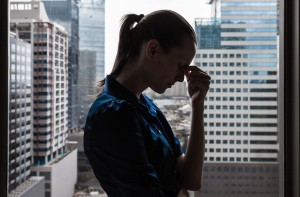The Florida Lung, Asthma and Sleep Specialists begin this week’s blog article with a mini-scenario:
Traffic is backed up, bumper to bumper, due to a free-way wreck. Lisa waits as patiently as she can, hating that she will be at least 30 minutes late for work. She taps her nails on the steering wheel. She regrets not having any breakfast and she worries about her unemployed husband’s job interview today.
She coughs lightly, as it begins to rain. Eventually the traffic lessens and she rushes through the red lights to work. As she grabs her briefcase, she notices her nine-year old has forgotten her book backpack and lunch for school. Her chest tightens and she wonders if she took her morning medicine.
Her boss has called an unexpected meeting and she frantically looks for her report in her computer file.
Then the school calls, and reports her 11 year old is sick with a very sore throat and needs to be picked up. Lisa’s cough has worsened and her shortness of breath is painful. Lisa has COPD and she is headed for a flare-up.
The stressful morning has been similar to the last 20 stressful mornings, which have put her chronic stress mode. She knows the stress is not good for her, but she feels helpless. By 4:30 that afternoon, she was admitted to the emergency room with a full-blown panic attack.
The Ugly Circle of COPD, Stress, Anxiety and Depression
Did you know that stress and COPD frequently go together? The morning described above would cause significant stress even in a normal person. However, for Lisa, the every-day  stress is compounded by the fact that she constantly endures an ever-present anxiety from being constantly short of breath.
stress is compounded by the fact that she constantly endures an ever-present anxiety from being constantly short of breath.
1. When you have COPD, the anxiety caused from being short of breath is always with you.
2. You have probably heard that we are hard-wired with a flight or fight system that ignites when we are in stress. Indeed, “Everyone has an alarm system deep in their brains that detects a breathing problem. If your “breathing alarm system” detects that you’re not getting enough air, it sends out a warning that feels like a sudden rush of anxiety.”
3. When you are a COPD patient, you feel like you never have enough air. “When you have COPD, you’re always struggling to get enough air, so your alarm system can become hyperactive.” This hyperactivity is in itself, a constant source of stress.
4. The cycle allows the symptoms to feed the stress and the stress fuels the COPD symptoms, and then it repeats.
Medical Research Shows Stress Actually Makes COPD Patients Sicker!
Daniel F. Dilling, MD, a pulmonary and critical care specialist at Loyola University Medical Center in Chicago, published a study in the journal, Multidisciplinary Respiratory Medicine on this topic.
His research demonstrated that anxiety and depression are common in people with COPD. The scientists discovered that anxiety and depression were present in almost half of the COPD patients they studied.
They also verified that “depression and anxiety increase as COPD progresses and that both conditions are closely linked to shortness of breath and inability to exercise.”
Likewise, Jessica Bon, MD, a pulmonary specialist and assistant professor of medicine at the University of Pittsburgh, stated, “Stress, anxiety, and depression are all common with COPD. Shortness of breath can make normal stress much worse and can even lead to panic attacks.”
A Few Tips for To Help You Manage Stress With COPD
At Florida Lung, Asthma and Sleep Specialists, we have seen COPD patients benefit and learn to cope with the stresses of daily life through a variety of ways. With the help of these tips, perhaps you or someone you love can learn to reduce stress and mitigate the symptoms of their disease.
In fact, some of the tips below look like they would be good for anyone to follow, whether they have COPD or not.
1. Try To Relax: It has been proven that relaxation techniques help to reduce stress. Meditation and guided muscle relaxation can help. Indulge every day in any gentle activity that assists you in letting go of stress.
2. Get Physicial! As difficult as it can be to do so, given the symptoms of coughing and shortness of breath, COPD patients are encouraged to get more exercise. “Exercise is a proven way to reduce stress.”
Gentle activities that don’t affect your breathing are beneficial. Dr. Bon states “Many people with COPD benefit from an exercise like yoga that combines movement with focused breathing.”
3. Remember to Eat–and Healthily! Forbid yourself to skip meals and plan a healthy diet.
4. Follow Your Treatment Plan–Every patient at FLASS receives a customized treatment plan. If you have a treatment plan and medication to take, make these practices a life-changing list of priorities. When you have COPD, following your treatment plan, set up by your doctor or your team, can make a huge difference in the quality of your life.
Next week FLASS (Florida Lung, Asthma and Sleep Specialists) will bring you more information on COPD. We will also add more tips for avoiding stress and COPD, since this topic is more extensive than a single blog permits.
Until then, compare the Tips on this list to the story of Lisa’s morning, and see if you can figure out how she could have avoided or at least, lessened her panic attack and the exacerbation of her COPD symptoms.



